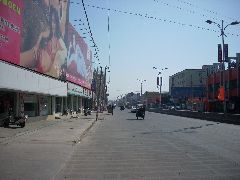This is supposed to be the richest province in China. I expected a big archway over the entrance, along with gold pavement, and security to keep out the Chinese, who aren’t allowed to move here. But instead, it was just a small sign at the side of the road. For those who don’t read Chinese characters, it says Fujian to the left, Guangdong to the right.
I liked riding through these scenes. Very traditional – I thought everyone here was involved in manufacturing now.
I didn’t really capture it very well, but there is a long strip here where it seems that 90% of the world’s supply of lingerie is made. All the companies have huge billboards advertising their wares. All shops are selling things like lace by the hundred metre roll, and sewing machines. Small vehicles roar around carting loads of material. It seemed to go on for about 15km. Jokes aside, it was actually pretty awful, way too much traffic, and too many billboards of barely clad women distracting me from the road.
The religion, and displays of it, changed as I got further south. Once again there were small shrines by the side of the fields. Most businesses had a shrine. Thankfully the petrol stations kept the burning incense well away from the tanks.
You may not be able to read them, but I liked these signs in the shopping mall in Shenzhen, just over the border from Hong Kong. “Severely punish the shadowing, the importuning and the case-dragging with any effort!” “The government decides to cracking down fakes intensively for another three years!” Of course every 3 steps someone tried to sell you fake DVDs or watches.
I didn’t really like Shenzhen too much. Too artificial, all too new. That and the city planners hated cyclists.
Surprisingly, I missed China, and was glad to get back into Guangdong, from Macau. This time with company, Sally, an English cyclist:
We came across several of these, built by overseas Chinese. Odd mix of architectural styles.
Yep, another day in China, fixing a puncture on an old bridge, looking over the fields.
Another big milestone. Six months for the first 10,000km, closer to four for the next 10,000.
Classic old-style boats, still working the rivers.














